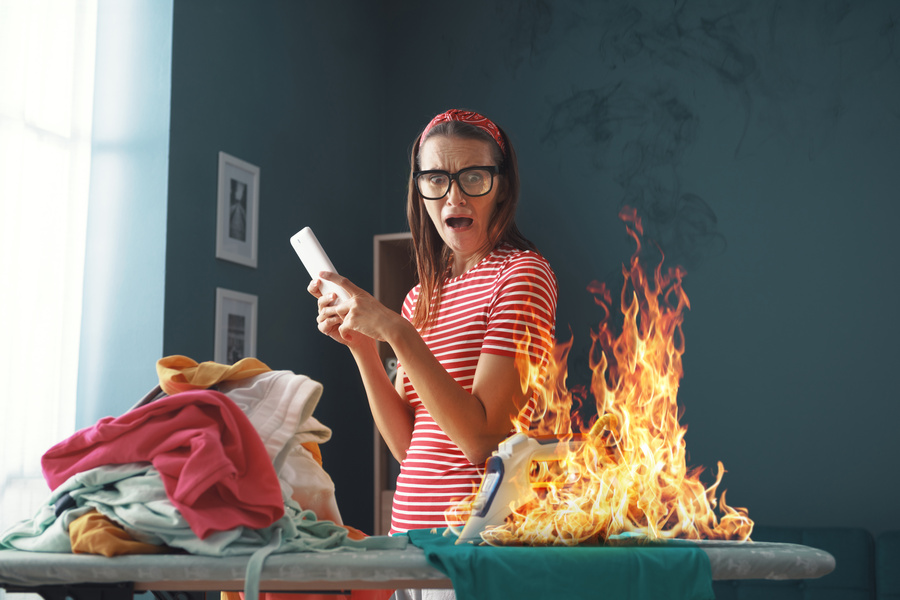From day to day, you don't think much about the risk of fire in your apartment. The risk of fire is higher than you think, and all it takes is a bit of carelessness in order for things to go bad very quickly. The statistics are real. FEMA (Federal Emergency Management Agency) reported that the top three causes of fires in homes are cooking, heating equipment, and electrical malfunction.

Apartment fires can spread really quickly, and it also puts your neighbors at tremendous risk since units abut one another, and there may be units above and below you. So, what's the breakdown of causes? You'd be surprised that it seems lean heavily towards cooking by a huge margin. The NFIRS (National Fire Incident Reporting System) listed the percentages:
- Cooking: - 73.6% of home-related fires
- Heating: - 5.2%
- Appliances - 2.8%
- Open flame - 2.6%
- Other/unintentional/careless - 2.6%
Does this sound like you have potential risks (and risky behavior) in your apartment? What are some things you can do to prevent apartment fires? You can chalk most of it up to common sense, but they're easy to overlook and/or ignore. Here's our list that should minimize your risk of fire.
Be Smart in the Kitchen
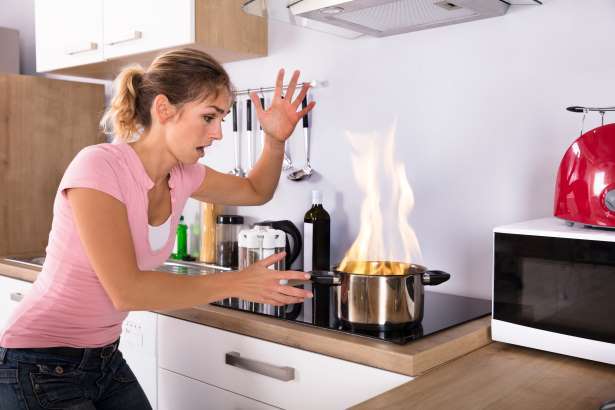
The fact that the vast majority of apartment fires come from cooking means there are tons of things going wrong when there's heat in the kitchen. We realize that busy families are in a hurry, and there are distractions galore, even more reason to be vigilant when you're firing up a meal as quickly as possible. Here are some important tips:
- Never leave an open flame or cooking surface unattended.
- Turn off the burner immediately when finished.
- Don't leave operating microwaves or toaster ovens unattended.
- Clean your oven on a regular basis. Food bits can catch fire.
- Keep towels and other kitchen cloths away from the stove.
- Never put metal in the microwave.
- Keep a fire extinguisher under the sink in the cabinet.
- Keep a box of baking soda next to the stove. It works great for grease fires.
Be Mindful Heat-Related Fire Risks
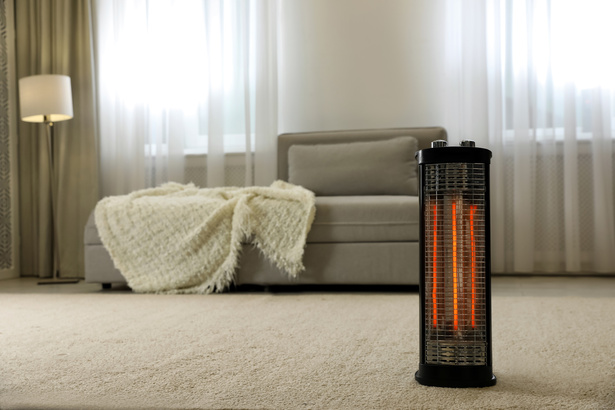
Space heaters are great supplemental heat sources when things get truly frigid, but they do pose a significant risk. Even models that don't show a glowing heat coil are risky because they look like fans but emit a lot of heat, which can easily cause a fire very quickly. You should, of course, never buy a space heater that doesn't have a auto-shutoff tip feature that cuts power to the heat as soon as the heater gets knocked over. But that alone won't eliminate risks. You should always do the following:
- Keep the heater away from drapes, upholstery, papers, and other potentially flammable materials.
- Follow the heater's recommended radius distance documented in the manual.
- Never leave the heater unattended, especially around kids and pets.
- Be mindful of product recalls for your model.
- NEVER use a stove or oven to heat your apartment.
Use Candles Wisely
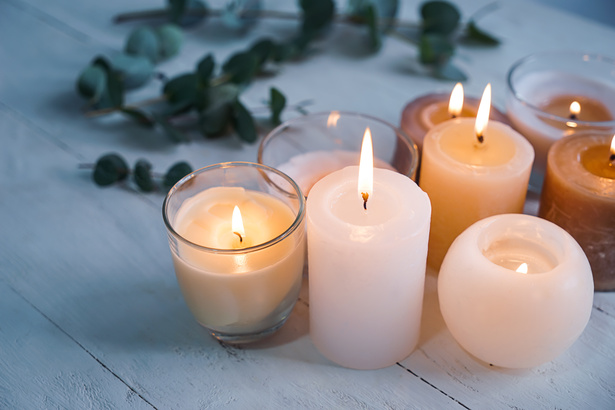
Oh, how romantic and calming candles can be. Plus, they smell great (except for Pumpkin Spice ones. Yuck). But with any open flame, there comes the risk of fire. 2% of reported home fires, 3% of home fire deaths, 6% of home fire injuries, and 4% of the direct property damage in home fires result from candles. If you stick a lit candle on a mantle, a table, a countertop, etc., and the long wick burns high without your paying attention, and something you thought was out of reach of the candle's flame suddenly bursts into flame. Or you light one, let it burn for hours, and you forget about it before going to bed. These are unnecessary risks. Also, don't light a ton of candles in order to recreate some stupid love scene from a movie. In the heat of passion, you just might knock them over. Here are some tips.
- Don't light more than a couple of candles at a time, and always keep the within view.
- Keep anything flammable away from a lit candle. Keep objects at least two feet away.
- Trim the wicks to a quarter inch before lighting.
- Avoid using candles for illumination when there's power outage. Stick to flashlights and battery-powered lanterns.
Don't Smoke
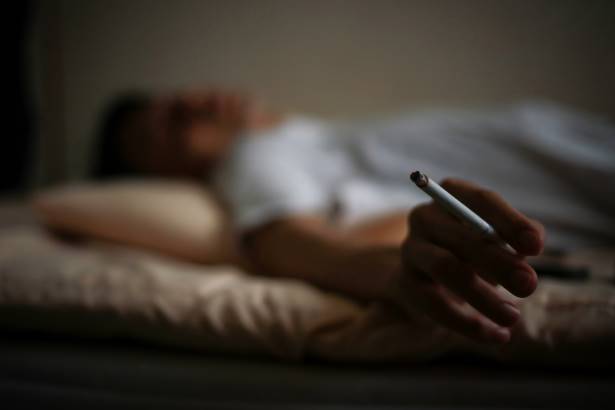
This one seems to be a no-brainer since most apartment buildings prohibit smoking in apartments and around the complex. But that doesn't mean renters don't sneak a drag now and then, which also happens to increase the risk of fire. You hear about fires starting when people fall asleep with a lit cigarette in their hand, and it can drop to the floor or land on the bed, quickly igniting whatever it touches. The advice here is simple: don't smoke. If you must, do it in your car or take a walk. There's nothing smart about smoking in your apartment.
Check Your Smoke Detectors
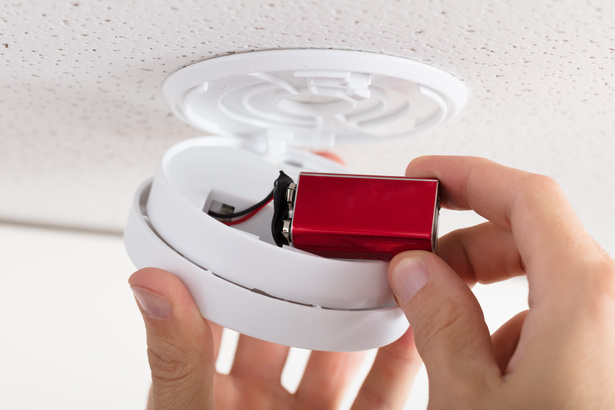
Sure, it's your landlord's responsibility to make sure all smoke detectors in the buildings and within your units are operating properly, but never assume that they're doing it. Some systems are hard-wired to electrical, but you should still test them. You should test your smoke detectors every month to make sure they are operational. Just push the button that's on the body (it should say "push to test") on the outside. Some units will chirp when the battery is low, but if you let it go long enough without changing the battery, the chirping will eventually fail to work. Keep batteries on hand and make sure you never let them go without power.
Keep Fire Extinguishers at the Ready

You think you'll never need a good fire extinguisher, and then the nearly unimaginable happens. If you think dumping water on a grease fire will work, it only makes things worse. Always have at least one fire extinguisher in your home, and it just can't be a single purpose version. Check the label or box to ensure that it is UL rated 1-A:10-B:C, which means it's designed to fight basic fires common to the home, including those involving fabrics, plastics, wood, flammable liquids, and electrical equipment. You can use it on cooking fires, electrical fires, and most other types of fire sources. Also, make sure you check the date on it for replacement or schedule a free inspection by the fire department.

